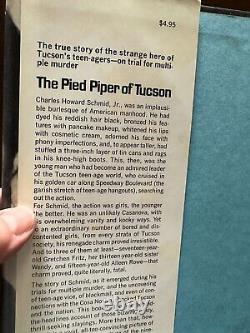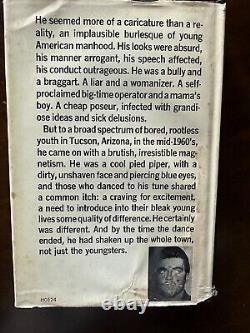
- Home
- Artist
- Art Werger (4)
- Beryl Cook (10)
- David Shepherd (3)
- Dface (6)
- Dolk (3)
- James Gillray (5)
- Jj Adams (6)
- John Doe (5)
- Madonna (6)
- Mason Storm (4)
- Metallica (3)
- Mf Doom (9)
- Mick Cawston (4)
- Quasimoto (4)
- Rolf Harris (3)
- Shepard Fairey (4)
- Sugababes (3)
- The Rolling Stones (3)
- Tracey Emin (3)
- Whatshisname (4)
- Other (3264)
- Cd Grading
- Format
- Language
- Release Title
- Type
- Action Figure (38)
- Album (20)
- Beanies (17)
- Box Set (29)
- Cigarette Lighters (17)
- Comic Book (59)
- Complete Game (17)
- Eau De Parfum (20)
- Eau De Toilette (15)
- Figurine (52)
- Game Board (17)
- Handheld System (18)
- Home Console (20)
- Novel (26)
- Print (117)
- Single (18)
- Soft Toys (22)
- Sunglasses (32)
- Trainer (34)
- Wristwatch (93)
- Other (2675)
The Pied Piper of Tucson by Don Moser and Jerry Cohen 1967 1st Edition VERY RARE








The Pied Piper of Tucson by Don Moser and Jerry Cohen 1967 1st Edition VERY RARE. Good condition -- see all photos and video. This is not one of the many reprints issued later. This is the actual book from. This has been deemed a culturally and historically important book. The photos you see here are photos of the actual book that you will receive. Many book sellers online post using stock photos that often don't resemble the book you actually receive.
It was Life and Time magazines that turned a local story from Tucson, Arizona, into a national abomination. Reporters came from all over, to be sure, but on March 4, 1966, Life printed an ominous photo of the desert landscape where three girls had disappeared and the story of Charles Howard Schmid, Jr. Or "Smitty, " became international news. He had been arrested four months earlier on November 11, just after marrying a fifteen-year-old girl whom he'd met on a blind date. The article was published even before the juries in two separate trials had decided his fate.
Dubbed "The Pied Piper of Tucson, " for his ability to get girls to fall for him, he stood five feet, four inches tall, but added three more inches by padding his stack-heeled cowboy boots with rags and tin cans. He also dyed his reddish-brown hair black, used pancake make-up, whitened his lips, and applied a fake mole to his left cheek-a "beauty" mark. He adopted the droopy-eyed look associated with Elvis, his idol, and acquired a rock musician's mystique. His tiny house on his parents' property was the scene of many parties.Tucson society was not merely shaken by the murders of three of their young women but by what the details of those murders revealed about its adolescent population-sex clubs, drinking parties, blackmail, cover-ups for murder, and even connections with the crime underworld. Parents suddenly became more strict, more aware now that their kids weren't safe and maybe weren't even behaving properly. When kids looked to someone like Charles Schmid for answers, there was something terribly wrong.

